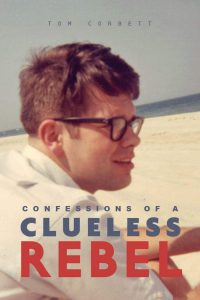Today, I’m pleased to introduce you to Tom Corbett, a memoirist whose books detail his life’s work in a way that is poignant, engaging, and wholly entertaining. Enjoy!
Confessions of a Clueless Rebel
Confessions of a Clueless Rebel is a witty, yet insightful, tour de force about breaking away from one’s childhood environment. Corbett brings us back to the post–World War II period when he came of age in a rough and tumble ethnic, working-class neighborhood. From a kid who showed no promise whatsoever, he underwent an array of transformative experiences from Catholic seminary training to the leader of a left-wing college group through Peace Corps service in India and eventually on to a remarkable career as a nationally respected policy wonk, university teacher, and sometime scholar. He shares a remarkable story about overcoming crippling self-doubt, a suffocating cultural straightjacket, and even a debilitating addiction to emerge on the public stage with renewed confidence and purpose. It is a story of personal rebellion and growth…of transformation and triumph. It is also a very private journey that brings you back in time, that makes you laugh often, think a lot, and perhaps even shed a tear or two.
Confessions of a Wayward Academic
Confessions of a Wayward Academic exposes the reader to the raw realities of doing public policy as opposed to merely studying it. Corbett celebrates his professional life in the world of policy as an exhilarating adventure, both challenging yet totally rewarding. He tells his story in the welfare and poverty policy trenches with a deft and light touch, bringing the characters and events to life with wit, wisdom, and sensitivity. While it reads much like a novel, this work exposes readers to the intimate complexities of realizing political and policy change from a perspective few can experience. It is an accessible journey that all who care about our nation and about our most vulnerable citizens should take.
Interview
What is your motivation to write these memoirs?
A number of years ago, my Peace Corps group (India) got together for a 40 year reunion of our return to the States. From that emotional gathering, two edited volumes emerged that recounted some of our most personal memories. I played a very large role in developing this project and found that I enjoyed the writing process. Having time in retirement, I decided to try a memoir of my early years and life as a policy guru who played a significant role in the welfare reform battles that raged for several decades. When I started, I soon realized that two works would be necessary, one that focused on my personal growth and change as a young man and a separate piece on my professional battles. Thus, Confessions of a Clueless Rebel (the early years) and Confession of a Wayward Academic (my professional battles). I suspect I wanted to set these down while I could still recount them.
Why should readers be interested?
My best guess is that each work will appeal to different audiences. Clueless Rebel will have broad appeal to anyone interested in the past, what it was like to grow up in the post World War II era, and how one young man negotiated the turbulent and transitional period of the 1950s and 1960s. This was an era of extraordinary social change and disruption which is captured with considerable fidelity in this book. Wayward Academic, on the other hand, will be of greater interest to readers with some interest in policy and politics. This memoir traces the long journey from a focus on a War-On-Poverty, announced by President Johnson in the 1960s, to a War-On-The- Poor in recent years. Both are written in a very witty and accessible style. They are meant to be entertaining as well as instructive. From the reviews and reader reactions to each, I have succeeded in that quest.
What are the take-aways?
Both simply are great reads, rendered with a deft touch and much humor. At the same time, both contain deeper lessons. Clueless Rebel is a story of transformation and redemption, of breaking away from one’s early cultural confines. I was raised in a provincial, working-class, ethnic, Catholic environment where everything was black and white and the answers to all questions were given. Through a series of remarkable experiences, unusual choices, and mere serendipity, I tell the story of how I broke out of my early normative shackles to forge a personal moral compass and direction in life. Wayward Academic picks up this story as I started on my professional journey through life. I try to share the joys and frustrations of doing policy work on some of the most wicked issues facing our nation, how to deal with poverty and need. I am hoping that students will pick up the challenges I enjoyed so much and carry this important work into the future. Both works are infused with hope and optimism.
How did you get into writing at this stage in life?
Mostly, it is an issue of opportunity. I anted to write even as a young kid in a working-class neighborhood where no one had such an ambition. However, my academic and policy career was all absorbing, leaving no time for this. Now, in retirement, I am giving full reign to my inner muses and having the time of my life. I enjoyed teaching, doing research, and consulting on policy at the highest levels but riting feels like what I was meant to do in life.
How do you go about the craft of writing?
When I am into a project, paragraphs and themes are always swirling through my head. Often, I cannot type fast enough to keep up with what I want to express. Particularly, at night before I fall asleep, I will think about where I am and think through where I want to g the next morning. I usually cannot wait to get to my computer each day. I simply love the creative process.
About the Author
 Thomas Corbett (Ph.D.) is an Emeritus Senior Scientist with the Institute for Research on Poverty where he served as Associate and Acting Director for a decade before his retirement. He earned a Ph.D. in Social Welfare from the University of Wisconsin-Madison and taught various Social Policy courses at the undergraduate and graduate levels in the School of Social Work. He has long studied social assistance systems that affect the well-being of disadvantaged families. In addition, he has explored methods for assessing program effectiveness and strategies for monitoring the status of vulnerable populations, including service on a National Academy of Sciences expert panel examining methods for evaluating contemporary welfare reform. He co-edited a book with Mary Clare Lennon (Columbia University) titled Policy into Action, an exploration of methods to evaluate the implementation of innovative initiatives and more recently (April, 2010) published a book (with Karen Bogenschneider, University of Wisconsin) on evidence-based policymaking. Over the years, he has worked on poverty-related policy issues at all levels of government, including a year as senior policy advisor at the U.S. Department of Health and Human Services where he worked on President Clinton’s first welfare reform Bill among other policy issues. In addition, he has worked with numerous senior state officials in the Midwest on various welfare reform issues through the Welfare Peer Assistance Network (WELPAN) and has consulted with many state and local sites in the U.S. and Canada who are developing integrated human service models in their jurisdictions. Beginning in 2010, Dr. Corbett has published nine books distributed across the fiction, memoir, and public policy genres. Now retired, he resides in Madison Wisconsin. For more information, see www.booksbytomcorbett.com.
Thomas Corbett (Ph.D.) is an Emeritus Senior Scientist with the Institute for Research on Poverty where he served as Associate and Acting Director for a decade before his retirement. He earned a Ph.D. in Social Welfare from the University of Wisconsin-Madison and taught various Social Policy courses at the undergraduate and graduate levels in the School of Social Work. He has long studied social assistance systems that affect the well-being of disadvantaged families. In addition, he has explored methods for assessing program effectiveness and strategies for monitoring the status of vulnerable populations, including service on a National Academy of Sciences expert panel examining methods for evaluating contemporary welfare reform. He co-edited a book with Mary Clare Lennon (Columbia University) titled Policy into Action, an exploration of methods to evaluate the implementation of innovative initiatives and more recently (April, 2010) published a book (with Karen Bogenschneider, University of Wisconsin) on evidence-based policymaking. Over the years, he has worked on poverty-related policy issues at all levels of government, including a year as senior policy advisor at the U.S. Department of Health and Human Services where he worked on President Clinton’s first welfare reform Bill among other policy issues. In addition, he has worked with numerous senior state officials in the Midwest on various welfare reform issues through the Welfare Peer Assistance Network (WELPAN) and has consulted with many state and local sites in the U.S. and Canada who are developing integrated human service models in their jurisdictions. Beginning in 2010, Dr. Corbett has published nine books distributed across the fiction, memoir, and public policy genres. Now retired, he resides in Madison Wisconsin. For more information, see www.booksbytomcorbett.com.


 Jill-Elizabeth LinkedIn
Jill-Elizabeth LinkedIn




Leave a Reply